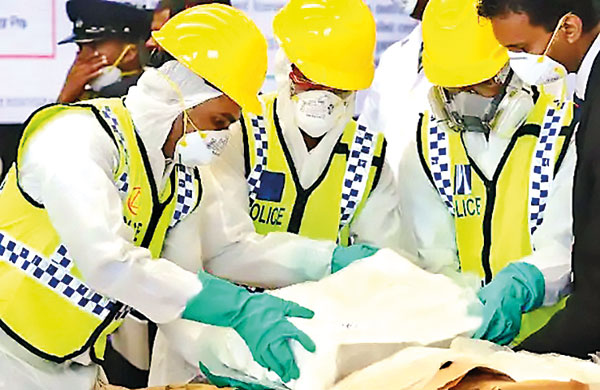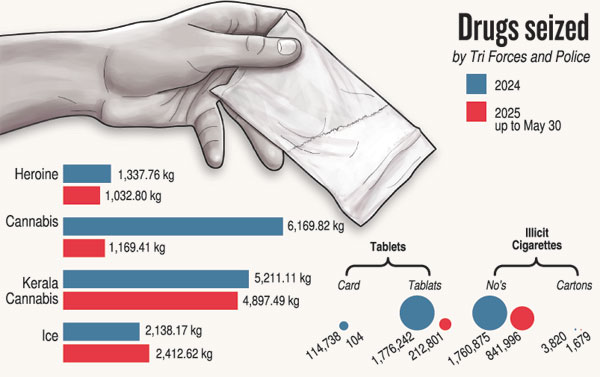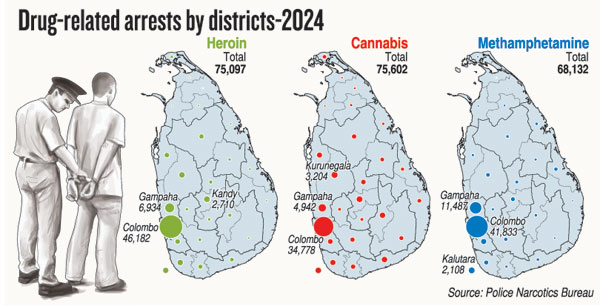News
Surge in drug-related arrests in 2024
View(s):By Dilushi Wijesinghe
Sri Lanka witnessed a sharp surge in drug-related arrests in 2024, with 228,450 individuals taken into custody nationwide, official data from the National Dangerous Drugs Control Board (NDDCB) and Police Narcotics Bureau (PNB) reveals.
Heroin remains the most prevalent drug linked to arrests, with 75,097 individuals, accounting for 32.9% of total detentions caught up in heroin-related offenses. The majority of these arrests were concentrated in Colombo and the Western Province, which recorded the highest volume of drug activity, followed by the Southern and Central Provinces. 
Cannabis-related arrests closely follow heroin, comprising 33.1% of all drug offenses with 75,602 arrests, reflecting the widespread cultivation and use of the substance across the island. However, a notable and concerning trend is the rapid rise in methamphetamine (locally known as “ICE”) use, which accounted for 68,132 arrests or 29.8% of the total, signaling a shift toward potent synthetic stimulants.
The North Central Province, particularly Anuradhapura, has seen an unexpectedly high rate of drug use and arrests.
Psychotropic substance abuse, including misuse of prescription drugs like tramadol and diazepam, is also emerging as a concern, alongside smaller but persistent occurrences of cocaine (82 arrests) and hashish (649 arrests).
In addition to the arrests, large volumes of narcotics and contraband were seized across the island. Heroin seizures climbed to 1,337 kilograms and 759 grams, while local cannabis recorded an increase, reaching 6,169 kilograms and 815 grams.
Kerala cannabis trafficked accounted for 5,211 kilograms and 111 grams. Methamphetamine, or “ICE”, remained a major concern with 2,138 kilograms and 172 grams taken into custody. The abuse of pharmaceutical drugs was reflected in the confiscation of 114,738 cards amounting to 1,776,242 tablets.
Illicit cigarettes also flooded the market, with 1,760,875 sticks smuggled in 3,820 cartons being seized by the tri-forces and the police.
This year, Heroin topped the tentative list with 1,032 kilograms and 800 grams recovered, followed closely by 1,169 kilograms and 417 grams of local cannabis.
A further 4,897 kilograms and 497 grams of Kerala cannabis were intercepted. Methamphetamine, or “ICE”, yielded one of the largest hauls on record, with 2,412 kilograms and 625 grams seized during operations.

The tri-forces and police also confiscated 104 cards and 212,801 tablets of drugs. Meanwhile, the smuggling of illicit tobacco products remains a persistent issue, with 841,996 cigarettes packed into 1,679 cartons being taken off the market during the year.
A sharp 20 percent increase in drug use among youth aged 19 to 26 has sparked concern among authorities, with the National Dangerous Drugs Control Board (NDDCB) stepping up efforts to address the issue.
The alarming rise is being attributed, in part, to the indirect influence of social media, where the promotion and glamorisation of drug use, intentional or not, have contributed to its spread among young people, especially in schools.
Chamara Karunarathne, Education Officer and Media Spokesman of the NDDCB told the Sunday Times that logistical and socio-economic issues continue to drive the underground drug trade in the country. The lack of financial stability has pushed some individuals to extreme measures. “People will do anything for money—even commit crimes. Some would kill for as little as Rs. 5,000. Selling drugs has become a desperate means of survival.”

“Despite these challenges, law enforcement is utilising available resources to curb drug trafficking. Drugs are commonly smuggled into the country via sea, air, and even postal services,” he said. The NDDCB has responded by organising specialised training programmes to better detect such smuggling attempts.
On the prevention front, the NDDCB continues to carry out awareness campaigns aiming to educate the public on the dangers of drug use and encourage early intervention across various levels such as schools, offices, and the media.
Several treatment centres operated by the NDDCB are currently functioning in Kandy, Nittambuwa, Battaramulla, and Galle, with new facilities being established in Jaffna, Kurunegala, and Matara. A dedicated rehabilitation centre for women is also expected to open in the coming months, though ongoing labour-related issues are a cause for delay.
Each Divisional Secretariat across the country is assigned a dedicated officer from the NDDCB, providing a point of contact for those seeking support or guidance on drug-related matters.
The public is encouraged to contact the NDDCB via its 24-hour hotline at 1927 for assistance or further information.
The best way to say that you found the home of your dreams is by finding it on Hitad.lk. We have listings for apartments for sale or rent in Sri Lanka, no matter what locale you're looking for! Whether you live in Colombo, Galle, Kandy, Matara, Jaffna and more - we've got them all!

